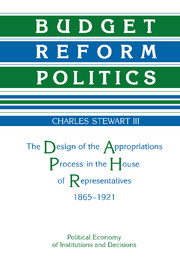Crossref Citations
This Book has been
cited by the following publications. This list is generated based on data provided by Crossref.
Swift, Elaine K.
and
Brady, David W.
1991.
Out of the Past: Theoretical and Methodological Contributions of Congressional History.
PS: Political Science & Politics,
Vol. 24,
Issue. 1,
p.
61.
Swift, Elaine K.
and
Brady, David W.
1991.
Out of the Past: Theoretical and Methodological Contributions of Congressional History.
PS: Political Science & Politics,
Vol. 24,
Issue. 1,
p.
61.
Coleman, John J.
1994.
State Formation and the Decline of Political Parties: American Parties in the Fiscal State.
Studies in American Political Development,
Vol. 8,
Issue. 2,
p.
195.
Ainsworth, Scott
1995.
Electoral Strength and the Emergence of Group Influence in the Late 1800s.
American Politics Quarterly,
Vol. 23,
Issue. 3,
p.
319.
Lehoucq, Fabrice Edouard
1996.
The Institutional Foundations of Democratic Cooperation in Costa Rica.
Journal of Latin American Studies,
Vol. 28,
Issue. 2,
p.
329.
Binder, Sarah A.
1996.
The Partisan Basis of Procedural Choice: Allocating Parliamentary Rights in the House, 1789–1990.
American Political Science Review,
Vol. 90,
Issue. 1,
p.
8.
Chapman, Bert
1999.
The 1907 admission of land-grant university depository libraries.
Journal of Government Information,
Vol. 26,
Issue. 4,
p.
385.
James, Scott C.
and
Lawson, Brian L.
1999.
The Political Economy of Voting Rights Enforcement in America's Gilded Age: Electoral College Competition, Partisan Commitment, and the Federal Election Law.
American Political Science Review,
Vol. 93,
Issue. 1,
p.
115.
Schickler, Eric
2000.
Institutional Change in the House of Representatives, 1867–1998: A Test of Partisan and Ideological Power Balance Models.
American Political Science Review,
Vol. 94,
Issue. 2,
p.
269.
Silbey, Joel H.
2000.
Current Historiographic Trends in the Study of the Twentieth-Century Congress.
Social Science History,
Vol. 24,
Issue. 2,
p.
317.
Polsby, Nelson W.
and
Schickler, Eric
2002.
LANDMARKS IN THESTUDY OFCONGRESS SINCE1945.
Annual Review of Political Science,
Vol. 5,
Issue. 1,
p.
333.
Samuels, David J.
2002.
Pork Barreling Is Not Credit Claiming or Advertising: Campaign Finance and the Sources of the Personal Vote in Brazil.
The Journal of Politics,
Vol. 64,
Issue. 3,
p.
845.
LYNCH, G. PATRICK
2002.
Midterm Elections and Economic Fluctuations: The Response of Voters Over Time.
Legislative Studies Quarterly,
Vol. 27,
Issue. 2,
p.
265.
Goodman, Craig
and
Nokken, Timothy P.
2004.
Lame-Duck Legislators and Consideration of the Ship Subsidy Bill of 1922.
American Politics Research,
Vol. 32,
Issue. 4,
p.
465.
Carson, Jamie L.
and
Engstrom, Erik J.
2005.
Assessing the Electoral Connection: Evidence from the Early United States.
American Journal of Political Science,
Vol. 49,
Issue. 4,
p.
746.
McCubbins, Mathew D.
2005.
Handbook of New Institutional Economics.
p.
123.
Cox, Gary W.
and
McCubbins, Mathew D.
2005.
Setting the Agenda.
Carson, Jamie L.
Engstrom, Erik J.
and
Roberts, Jason M.
2006.
Redistricting, Candidate Entry, and the Politics of Nineteenth‐Century U.S. House Elections.
American Journal of Political Science,
Vol. 50,
Issue. 2,
p.
283.
ADLER, E. SCOTT
and
WILKERSON, JOHN D.
2008.
Intended Consequences: Jurisdictional Reform and Issue Control In the U.S. House of Representatives.
Legislative Studies Quarterly,
Vol. 33,
Issue. 1,
p.
85.
McCubbins, Mathew D.
2008.
Handbook of New Institutional Economics.
p.
123.



